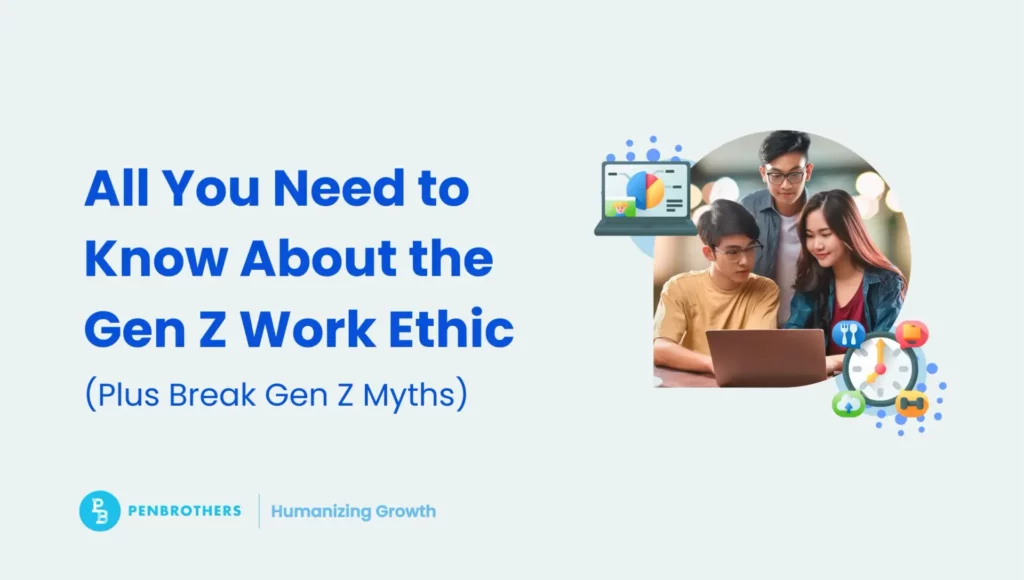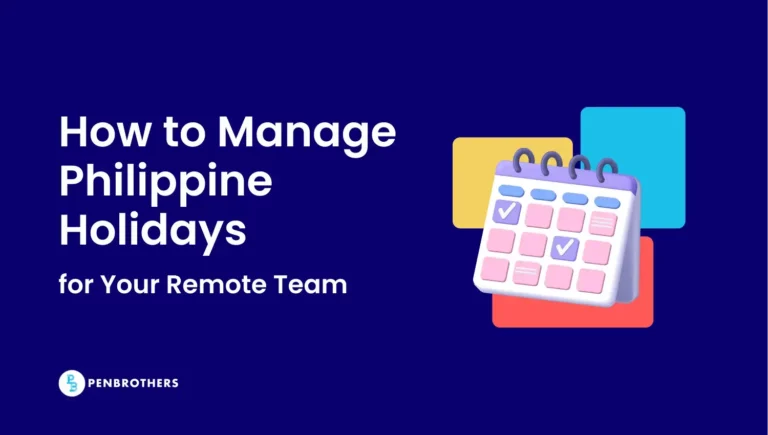Key Takeaways
- A Redefined Work Ethic, Not a Lack of One: Gen Z’s approach to work is not about rejecting tradition but about redefining productivity. They prioritize adaptability, purpose-driven work, continuous learning, and healthy boundaries over a simple focus on long hours.
- A Strategic Advantage for Modern Businesses: For global hiring managers, these redefined work ethics are a competitive advantage, not a challenge. Gen Z’s innate digital maturity reduces training costs, their cultural adaptability is ideal for hybrid and remote teams, and their desire to contribute to a larger mission leads to innovation, not just compliance.
- Filipino Gen Z are an Ideal Solution for Global Talent Gaps: Filipino professionals from this generation are particularly well-suited for global teams. They combine the inherent strengths of the Filipino workforce—such as strong English proficiency and a collaborative mindset—with the digital fluency and adaptability that define their generation.
- The Right Environment is Key to Unlocking Their Potential: To harness the full value of the Gen Z workforce, companies must move beyond outdated management styles. Success requires providing a clear purpose for their work, offering opportunities for continuous learning, and fostering a supportive structure with transparent leadership.
- Filipino professionals from this generation bring both digital fluency and strong adaptability, making them ideal partners for global companies navigating hybrid and remote-first operations.
Is Gen Z Difficult in the Workplace?
For years, conversations about younger professionals have been clouded by stereotypes: too entitled, too distracted, or too dependent on technology. But if you step back and look at actual workplace data and lived experience, the reality is much more pragmatic.
This generation has redefined what “work ethic” means. Instead of blind loyalty to long hours, Gen Z prioritizes:
- Adaptability in fast-changing digital environments.
- Purpose-driven work that anchors jobs to a bigger and growth-focused mission.
- Continuous learning is powered by resources available online and verified by their networks.
- Healthy boundaries that improve long-term productivity and reduce attrition.
For hiring managers, this isn’t a challenge. It’s a playbook for building the kind of future-ready teams you need.
The Information Most Content Misses
Most articles about younger employees focus on “surface-level” generational differences: phone habits, social media, or unrealistic expectations. What’s often missing and what matters most to decision-makers like you are insights into how these work behaviors impact business outcomes when hiring offshore.
Here’s what isn’t usually covered but directly affects your strategy:
- Retention Over Replacement
Gen Z employees are more likely to leave if they feel underutilized or disconnected from company values. With the right engagement model, you don’t just fill seats. You create long-term contributors. - Cultural Adaptability as a Business Asset
Unlike older generations who often had rigid work cultures, this workforce thrives in multicultural, hybrid setups. For companies hiring in the Philippines, this adaptability reduces friction and accelerates integration with global teams. - Digital Maturity That Outpaces Training Costs
This is the first truly “digital native” workforce. That means less investment in technical ramp-up and faster time-to-productivity for clients who rely on modern tools and platforms. - Shift From Compliance to Contribution
They aren’t looking to “just follow orders.” They want to understand why their work matters. When you communicate that clearly, you get not just compliance but innovation.
How Filipino Gen Z Professionals Solve Global Hiring Challenges
If you’re struggling to secure top talent in your local market, here’s why Filipino professionals in this generation stand out:
- Strong English proficiency and global cultural fluency make them seamless fits in multinational teams.
- Educational systems in the Philippines emphasize adaptability and collaborative problem-solving. These are skills Gen Z amplifies naturally.
- Economic resilience and motivation. Filipino workers value stable, purpose-driven roles and are more likely to stay if they feel invested in.
- Offshoring infrastructure through partners like Penbrothers provides not only access to this talent pool but also compliance, onboarding, and engagement strategies that align with your organizational culture.
From Skepticism to Strategic Advantage
Some clients approach Gen Z with hesitation, assuming they would require more hand-holding. But in practice, when given proper onboarding and clear expectations, they outperform in areas that matter most today: innovation, adaptability, and long-term engagement.
One client, a U.K.-based shipping company, initially wanted to build a reliable data team. When we connected them with a team of highly motivated Filipino Gen Z hires, they not only exceeded KPIs. These young team members were promoted several times in a period of one or two years since they joined Spotship. He worked on a time and motion workflow that provided 99% data accuracy for his growing team.
The plot twist? He’s not from tech. He’s a marketing graduate who tried accountancy work for one of the biggest restaurant brands in the Philippines before joining Spotship!
The lesson? The new workforce isn’t a liability. It’s a competitive edge if you know how to harness it.
A Progressive Path Forward
If you’re a global hiring manager wrestling with rising costs and talent gaps, here’s the shift to make:
- Stop comparing this generation to the work habits of the past.
- Start designing roles that align with their adaptability, digital fluency, and values-driven mindset.
- Partner with an offshore provider who understands how to bridge cultural expectations while keeping compliance and retention at the center.
Gen Z’s approach to work doesn’t diminish productivity. It redefines it. And for companies willing to embrace that, the Philippines offers not just talent, but a new blueprint for growth.
Final Thought
Your next strategic advantage won’t come from squeezing more hours out of exhausted workers. It will come from building future-proof teams that thrive on purpose, adaptability, and digital readiness. Filipino Gen Z professionals, when connected through the right offshoring partner, are already proving they can deliver exactly that.
Frequently Asked Questions
No, that perception often comes from a misunderstanding of their work ethic. Rather than focusing on traditional metrics like long hours, Gen Z prioritizes adaptability, purpose-driven work, and maintaining healthy boundaries to ensure sustainable, long-term productivity and avoid burnout.
In practice, it means they are highly adaptable to new technologies and fast-changing work environments. They are motivated by understanding the purpose behind their tasks and actively seek opportunities for continuous learning. They value flexibility and clear boundaries that allow them to perform at their best.
As the first truly “digital native” workforce, Gen Z employees require significantly less time and investment in technical ramp-up and training on modern software and platforms. This leads to a faster time-to-productivity for companies that operate in a digital-first environment.
They combine the generational strengths of being digitally native and highly adaptable with the specific advantages of the Filipino workforce. These advantages include strong English proficiency, a high degree of cultural fluency with Western businesses, and a strong motivation for stable, purpose-driven roles.
Gen Z employees thrive under a management style that provides a clear purpose and expectations rather than just a list of orders. They are highly motivated by opportunities for continuous learning, mentorship, and transparent leadership. When they understand the “why” behind their work, their focus shifts from simple compliance to active contribution and innovation.






